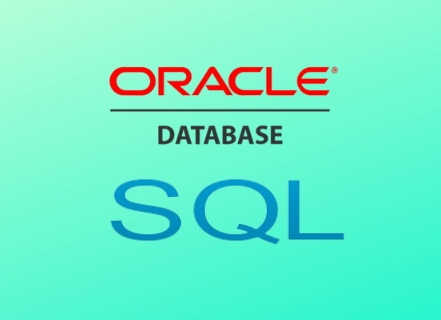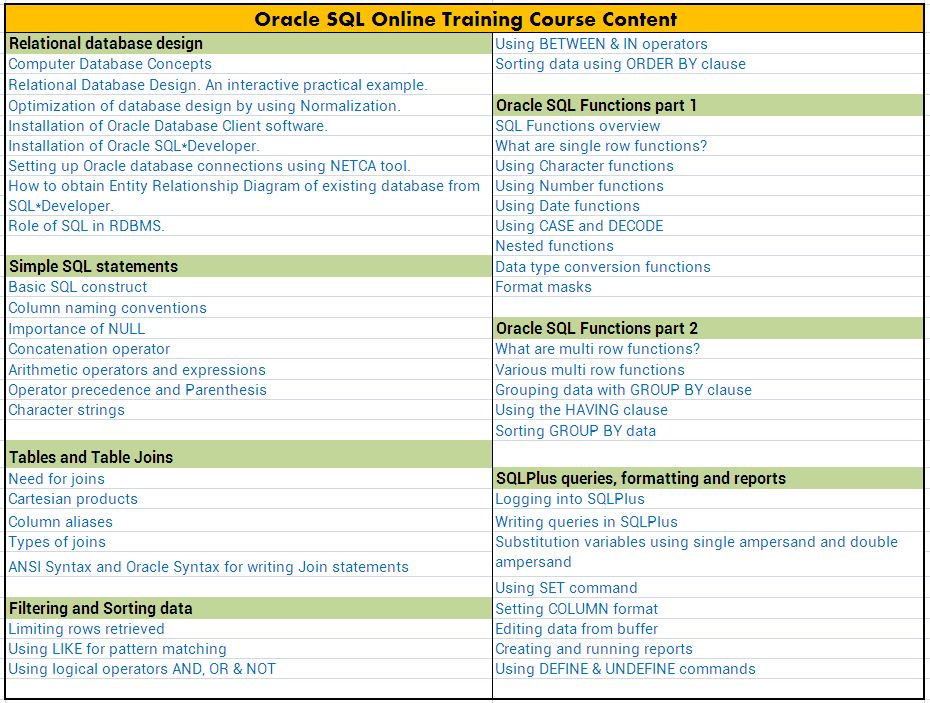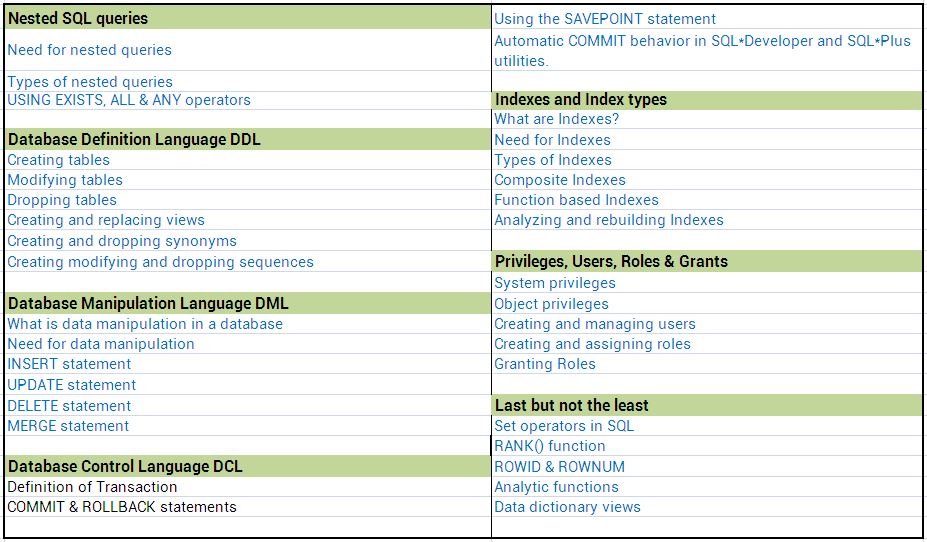
Introduction to Oracle SQL Training:
Oracle is one of the world’s largest database technology assets and it is created by Oracle Corporation. Oracle is one of the most popular RDBMS and most demanding database management systems. This is the largest database technology. It is the biggest database technology. Oracle refers to the collection of data and the utilization of SQL queries. In many Organizations, Oracle is used for storing and retrieving the structural data. Oracle helps to study both the SQL as well as Pl/SQL. Learn Oracle SQL Training from IdesTrainings!
IdesTrainings provides enough knowledge on Oracle by highly experienced and real-time Industry Experts and also various prominent and worthy Oracle SQL Certification Courses across the world. Anyone who wants to lead the IT industry can register for Oracle SQL Training and opt from a wide range of Oracle Training Courses at IdesTrainings.
Prerequisites for Oracle SQL Training:
To learn Oracle SQL Training at our IdesTrainings the candidate should have a basic knowledge on
- Database Management System (DBMS).
Oracle SQL Training Course Details:
- Course Name: Oracle SQL Training
- Mode of Training: We provide Online Training and Corporate Training for Oracle SQL Course
- Duration of Course: 30 Hrs
- Do We Provide Materials? Yes, If you register with IdesTrainings, the Oracle SQL Training Materials will be provided.
- Course Fee: After register with IdesTrainings, our coordinator will contact you.
- Trainer Experience: 15 years+
- Timings: According to one’s feasibility
- Batch Type: Regular, Weekends and Fast track
ORACLE SQL ONLINE TRAINING COURSE CONTENT


Overview of Oracle SQL Training:
Oracle is a complex system, without the analysis of the concept of Oracle architecture; it’s really hard to work. If you’re new to Oracle or an experienced DBA, it’s crucial to succeed in Oracle certification in the real world.
The Oracle system is basically two things that are divided into
- Oracle Instance
- Oracle Database.
Oracle Instance is a matter of interacts with users in terms of storing and retrieving information. Anything that is going into the database or coming out of the database has to done through Oracle Instance. To communicate with Oracle Instance we should learn Genie’s language: SQL first. So after learning SQL, we will be fully capable to command the Instance.
Basics of Oracle SQL in Oracle SQL Training:
SQL is the language we use to communicate with the Oracle Instance concept. Before moving forward with SQL language I would like to clarify the three terms is used extensively and sometimes some people are confused. These include SQL, PL / SQL, and SQL * plus, whereas SQL is the language and PL/SQL is the superset of SQL and the third one is SQL*Plus is mainly the environment where we write SQL or PL/SQL commands.
SQL is nothing but a set of commands/statements and is categorized into the following five groups. They are
- DQL: Data Query Language
- DML: Data Manipulation Language
- DDL: Data Definition Language
- TCL: Transaction Control Language
- DCL: Data Control Language
What are the SQL Operators in Oracle SQL Training?
An operator works on separate data items and returns a result. The data items are known as operands or arguments. Operators are indicated by special characters or by keywords. For instance, the plus operator is represented by a plus (+) sign and the operator that checks for nulls are represented by the keywords IS NULL or IS NOT NULL.
There are many SQL Operators. They are
- Arithmetic operators
- Comparison operators
- Logical operators
- Operators used to negate conditions
How Oracle SQL Works?
The strengths of SQL are providing benefits for all types of users, including application programmers, database administrators, managers, and end users. Technically speaking, SQL is a data sublanguage. The purpose of Oracle SQL is to provide an interface to a relational database such as Oracle Database, and all SQL statements are like instructions to the database. This Oracle SQL differs from general-purpose programming languages like C and BASIC. The following are the Oracle SQL features. They are
- Oracle SQL processes sets of data as groups rather than as individual units
- It offers automatic navigation to the information or data
- Oracle SQL uses statements that are complex and powerful, and that therefore stand alone. Flow-control statements were not part of SQL originally, but they are recently found in an accepted optional part of SQL, ISO/IEC 9075-5: 1996. Flow-control statements are commonly called as “persistent stored modules” (PSM), and the PL/SQL extension to Oracle SQL is more similar to PSM
Now, SQL allows you to work with data at the logical level. You must be concerned with the implementation details only when you want to manipulate the data. For instance, to retrieve a set of rows from a table, you define a condition used to filter the rows. All rows fulfilling the condition are retrieved in a single step and can be passed as a unit to the user, to another SQL statement, or to an application. You no need to deal with the rows one by one, nor do you have to worry about how they are physically stored or retrieved. All SQL statements use the optimizer, as a part of Oracle Database that determines the well-organized means of accessing the specified data. Oracle SQL also provides techniques that you can use to make the optimizer to perform its job better.
“If any student misses the session than we also provide backup sessions according to student flexibility.”
What are the differences between Oracle SQL & MySQL?
Oracle is one of the leading database management system released by Oracle Corporation and MySQL is also a database management system sponsored by a company named MySQL AB. Now, MySQL is also acquired by Oracle Corporation.
Let’s compare the major differences between Oracle and MySQL points wise.
MySQL:
- MySQL is an open source and now it is available for free download and installation.
- In MySQL, user authentication is performed by using location, username, and password.
- The flexibility of creating stored procedures and functions using PL/SQL is very less in MySQL
- It offers very few commands related to generating output as report and defining variables. MySQL includes very simple SQL commands
- In the MySQL server, it does not have the audit vault feature
- MySQL does not provide tools at the enterprise level
- It has only a table locking facility
- MySQL does not have extensive storage features like table space, synonym, packages, etc.
- MySQL database does not support XML
- MySQL always supports only two character types namely CHAR and VARCHAR
- MySQL temporary tables are only visible, within the current active session. If the session is expired, the temporary tables will be removed automatically
- It has only two backup mechanisms namely mysqlhotcopy and mysqldump
Oracle SQL:
- The only Oracle Express Edition is free of cost. But it has very limited features when compared to MySQL. For extensive features, we have to be purchased either Oracle Standard Edition or Oracle Enterprise Edition
- Oracle SQL provides enhanced database security. In Oracle, user authentication is performed by specifying global roles in addition to location, username, and password. And also, user authentication is performed by different authentication methods including database authentication, external authentication, and proxy authentication
- When compared to MySQL, Oracle SQL provides more flexible features for creating stored procedures and functions using PL/SQL
- Oracle SQL includes extensive SQL commands in SQL*Plus including commands for generating output as report and defining variables
- Oracle offers audit vault facility
- Oracle SQL provides tools at the enterprise level
- Oracle SQL provides the row locking facility as well
- Oracle SQL has very extensive storage features. It supports table space, synonym, packages, and all other features
- Oracle SQL supports and uses XML.
- Oracle supports four different character data types namely: CHAR, VARCHAR2, NCHAR, and NVARCHAR2
- Temporary tables are persistent in Oracle SQL, across sessions. The temporary table has to be removed by the User
- Oracle SQL offers many backup mechanisms including hot backup, backup, import, export, and many others
Which one is better to learn SQL or PL/SQL?
This is the way to think about it: To create an effective, secure, and manageable applications in the Oracle database, you must use a full-size technology built-in database. You must have an Oracle Database Development Engineer. SQL is the primary language to query and manipulate relational databases, for example, Oracle, MS SQL Server, MySQL, SQLite, DB/2. If you want to do anything with a relational database, First you have to learn this. The different database systems support different dialects of SQL. However, SQL is not suitable to write programs but procedural sequences, do one thing after another, query the database, store the result in a variable, it can do some calculations, store the result in the database again. To do that, you require a procedure language, and indeed the database systems offer proprietary procedural languages that fit well to their SQL dialect.
PL/SQL is Procedural language for Oracle. PL/SQL is perhaps the most elaborate one among those. To learn any of that PL/SQL, you need a working knowledge in SQL first. Nowadays, PL/SQL stuff will be typically done outside the database in maybe Java, but you still will need the procedures for things like triggers.
We IdesTrainings also provide training for Oracle PL/SQL. If you want to learn PL/SQL, take a look at Oracle PL/SQL Training
To become a SQL Server developer, Join in IdesTrainings
get job ready & be in demand!
IdesTrainings offers the Best Oracle SQL Training from the past 5 years. We are having more than 10+yr experience expert trainers. We are providing a real-time and job oriented training program in Oracle SQL. Our Oracle SQL Online Training offers a deep understanding of fundamentals and practical usage of technology. Don’t Miss Out! Join this Oracle SQL Course Today!
Conclusion to Oracle SQL Training:
Oracle has many popular features in the business world. New versions of Oracle Database were released with new and improved features of businesses and organizations. In the software market, Oracle has played a prominent role in their loneliness to provide complete databases. Therefore, the use of Oracle Databases has many advantages.
At IdesTrainings, learn about Oracle SQL and Oracle PL/SQL to see and understand your business data better. We provide Best Oracle SQL Training with real-time industry experts. Our highly skilled professionals will give you in-depth knowledge about Oracle SQL Online Training. With our real-time experts, you can get the learning methodology starting from the basics to the most advanced level.


